Category Archives: CAP Congress 2015
Rachid Ouyed talks about quark novae and the quark stars they could produce
By Hamish Johnston
Recently I blogged about quark novae, which are a passion of the University of Calgary astrophysicist Rachid Ouyed. I caught up with Ouyed at the Canadian Association of Physicists Congress in Edmonton last month, where between sessions he was busy writing a paper about quark novae.
I managed to coax him away from his calculations for long enough to record the above video, in which he talks about quark novae – huge explosions that some astrophysicists believe could occur shortly after some supernovae. Ouyed also talks about the quark stars that may be left behind and how quark novae could affect how astronomers measure cosmological distances.
View all posts by this author | View this author's profile
Busting dust deep underground in SNOLAB
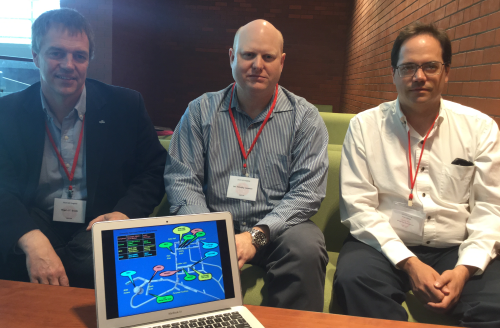
Squeaky clean: SNOLAB’s Nigel Smith (left), Ian Lawson (centre) and Chris Jillings.
By Hamish Johnston at the CAP Congress in Edmonton, Alberta
I’m a bit of a DIY enthusiast and one thing that I know about drilling into a masonry wall is that you should hold a vacuum-cleaner hose to the hole or you will end up with dust all over the wall and the floor below. Believe it or not, that is exactly what workers at SNOLAB in Canada do in order to keep background levels of radiation from affecting their dark-matter and neutrino detectors.
View all posts by this author | View this author's profile
The physics of Alzheimer’s disease
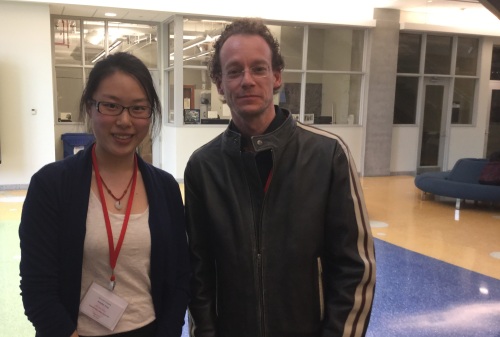
Jennifer Tang and Maikel Rheinstadter.
By Hamish Johnston at the CAP Congress in Edmonton, Alberta
One promising route to understanding the causes of Alzheimer’s disease (AD) – and hopefully finding a cure – is the study of how and why proteins in the brain sometimes form neurotoxic plaques. These plaques are disc-like structures that are about 50 µm in diameter and made from polypeptides. Their presence in the grey matter of the brain is strongly associated with AD and some other neurological conditions, but why they form and why they cause dementia are both not understood.
View all posts by this author | View this author's profile
Muzzling scientists leads to mistrust of government says physicist MP
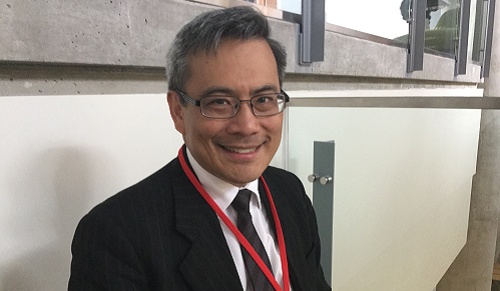
Canadian MP Ted Hsu believes in free speech for government scientists.
By Hamish Johnston at the CAP Congress in Edmonton, Canada
Yesterday I caught up with Ted Hsu, who is member of the Canadian parliament for Kingston and the Islands – and a former physicist. Hsu is a member of the Liberal party, which means he sits on the opposition benches. There he has been an outspoken critic of the current Conservative government over its apparent “muzzling” of scientists on the federal payroll. He believes that when governments seek to silence their experts it leads to more public mistrust of government.
View all posts by this author | View this author's profile
Debating warp bubbles and quark novae over beer and samosas
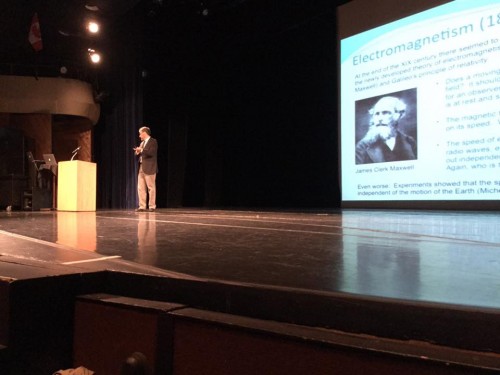
Time traveller: Miguel Alcubierre works the crowd in Edmonton.
By Hamish Johnston at the CAP Congress in Edmonton, Canada
The first day of the Canadian Association of Physicists (CAP) Congress at the University of Edmonton closed yesterday on the theme of time travel. Surely that is science fiction, you are thinking? But Miguel Alcubierre of the National Autonomous University of Mexico (UNAM) wasn’t joking when he delivered the Herzberg Memorial Lecture yesterday evening (although he did giggle a lot during his talk, which was very endearing). The session was called “Faster than the speed of light” and it was a fascinating romp through some of the more bizarre implications of Einstein’s general theory of relativity (GR) – which is 100 years old this year.
View all posts by this author | View this author's profile
Lament for ‘the reactor that can do everything’
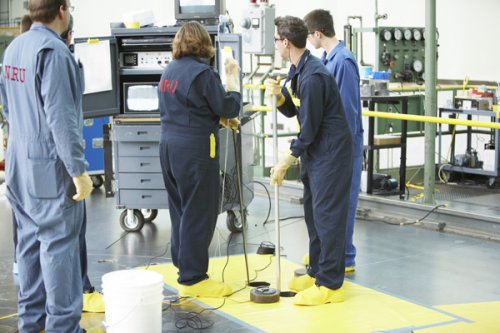
Inside the NRU. (Courtesy: Atomic Energy of Canada)
By Hamish Johnston at the CAP Congress in Edmonton
In 1957 Atomic Energy of Canada built “a reactor that can do everything” at Chalk River, Ontario. Dubbed the National Reactor Universal – or NRU – that facility will shut down for good in 2018 and Canada’s neutron-science community is now pondering its future.
In the short term, physicists will have to travel abroad to use neutron sources, such as those at Oak Ridge in the US and Grenoble in France. The challenge during this 10–15 year period will be to keep the research community together and make sure that vital skills and expertise built up over decades at the NRU will be retained. In the longer term, there are calls for Canada to build a new neutron facility, but it is by no means clear whether that will happen.
‘Physics across Canada’ tour kicks off in Edmonton
By Hamish Johnston
Greetings from Edmonton on the western edge of the Canadian prairies, where I am starting my “Physics across Canada” tour. The nation’s physicists are gathering here for the annual Canadian Association of Physicists Congress at the University of Alberta.
The congress opens today with a session that promises to be out of this world. Exoplanet expert Sara Seager of the Massachusetts Institute of Technology is talking about the search for habitable worlds beyond our blue planet. I am really keen to learn more about the latest techniques for studying the atmospheres of exoplanets and I plan to record an interview about that very subject later this week.
View all posts by this author | View this author's profile